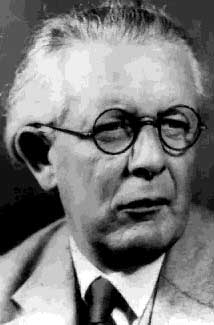
Cognitivism (as a Pedagogical Philosophy) focuses on how the mind processes and uses information. Within cognitivism, tasks are analyzed and then broken down into smaller steps and/or chunks. Information is then taught from the most simple to the most complex based on the learner's prior knowledge. Cognitive learners use schema or mental maps to help organize information and tie the material to existing knowledge to aid memorization. This method pays attention to the learner's specific differences by accommodating and approaching information in various ways. Psychologists of Cognitivism have challenged the limitations of Behaviorism in terms of observable behavior.

Some Important Cognitivism Theorists:
 |
|
 |
|
 |
|
Piaget's Stages of Cognitive Development
Piaget's Theory of Cognitive Development (1970) identified four major stages in which children progress: sensorimotor, pre-operational, concrete operational and formal operational. This theory suggests that these stages reflect differences in a child's cognitive abilities and that learners cannot be taught key cognitive tasks unless they have reached a particular stage of cognitive development. The video below illustrates the cognitive development in each stage.

References:
- Anderson, J. (1996). A simple theory of complex cognition. American Psychologist, 51(4), 355-365. Retrieved April 27, 2011, from http://homepage.psy.utexas.edu/homepage/group/loveLAB/love/classes/CompCogsci/2010/Anderson.pdf
- Anderston, J. R. (2009). [Web]. Retrieved from
- Bankston, A. (2008). Behaviorism, cognitivism, and constructivism. Retrieved from http://abanksto.myweb.uga.edu/portfolio/bankston_learning.pdf
- Brain (2010). [Web]. Retrieved from http://educ6040fall10.wikispaces.com/file/view/brain.jpg/164565625/brain.jpg
- Campbell, S., & Jorda, M. (2007). Cognitivism and constructivism. Retrieved from http://www.coe.fau.edu/faculty/cafolla/courses/eme6051/cognitivism.htm
- Cooper, S. (2009). John R. Anderson: adaptive character of thought (act*). Retrieved from http://www.lifecircles-inc.com/Learningtheories/JRAnderson.html
- Davis, T., Hummel, M., & Sauers, K. (2006). Piaget's cognitive development stages. [Web]. Retrieved from http://projects.coe.uga.edu/epltt/images/b/b8/Piaget_1.jpg
- Gagne, R. (2001). [Web]. Retrieved from http://userwww.sfsu.edu/~foreman/itec800/finalprojects/danabayer/images/gagne.gif
- Ho, W. (n.d.). Cognitive theories of learning. Retrieved from http://www.personal.psu.edu/users/w/x/wxh139/cognitive_1.htm
- Kearsley, G. (2011). Conditions of learning. Retrieved from http://tip.psychology.org/gagne.html
- Learning and remembering meaningful information: a cognitive model. (1996). [Web]. Retrieved from http://www.longleaf.net/ggrow/StrategicReader/StratFig1.gif
- Lein, K. (2009). elearning pedagogy. Retrieved from http://elearningpedagogy.com/cognitivist.html
- Online learning theories. (2010). Retrieved from http://www.about-elearning.com/learning-theories.html
- Piaget, J. (2011). Retrieved from http://www.nndb.com/people/359/000094077/
- Piaget, J. (2011). [Web]. Retrieved from http://www.nndb.com/people/359/000094077/piaget-3.jpg
- Piaget's stages of cognitive development. (2008). [Web]. Retrieved from http://www.youtube.com/watch?v=9yhXjJVFA14